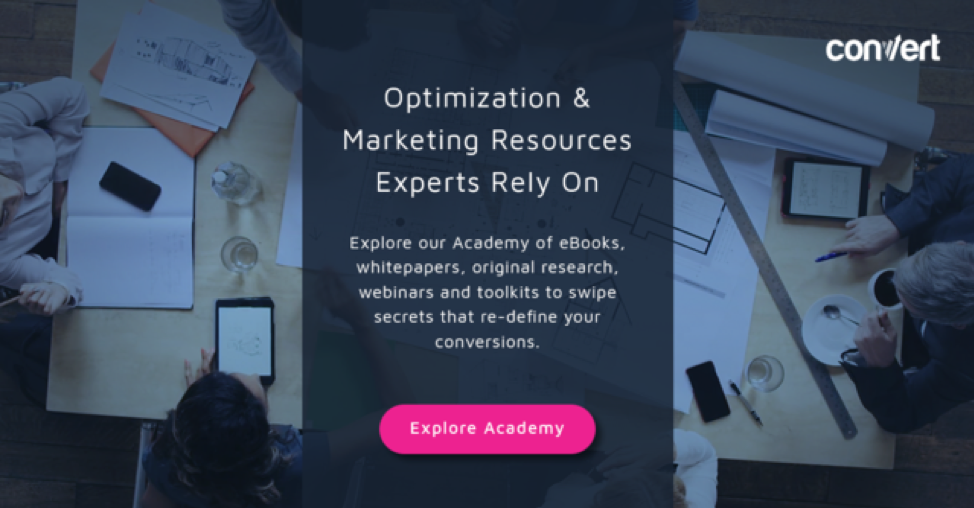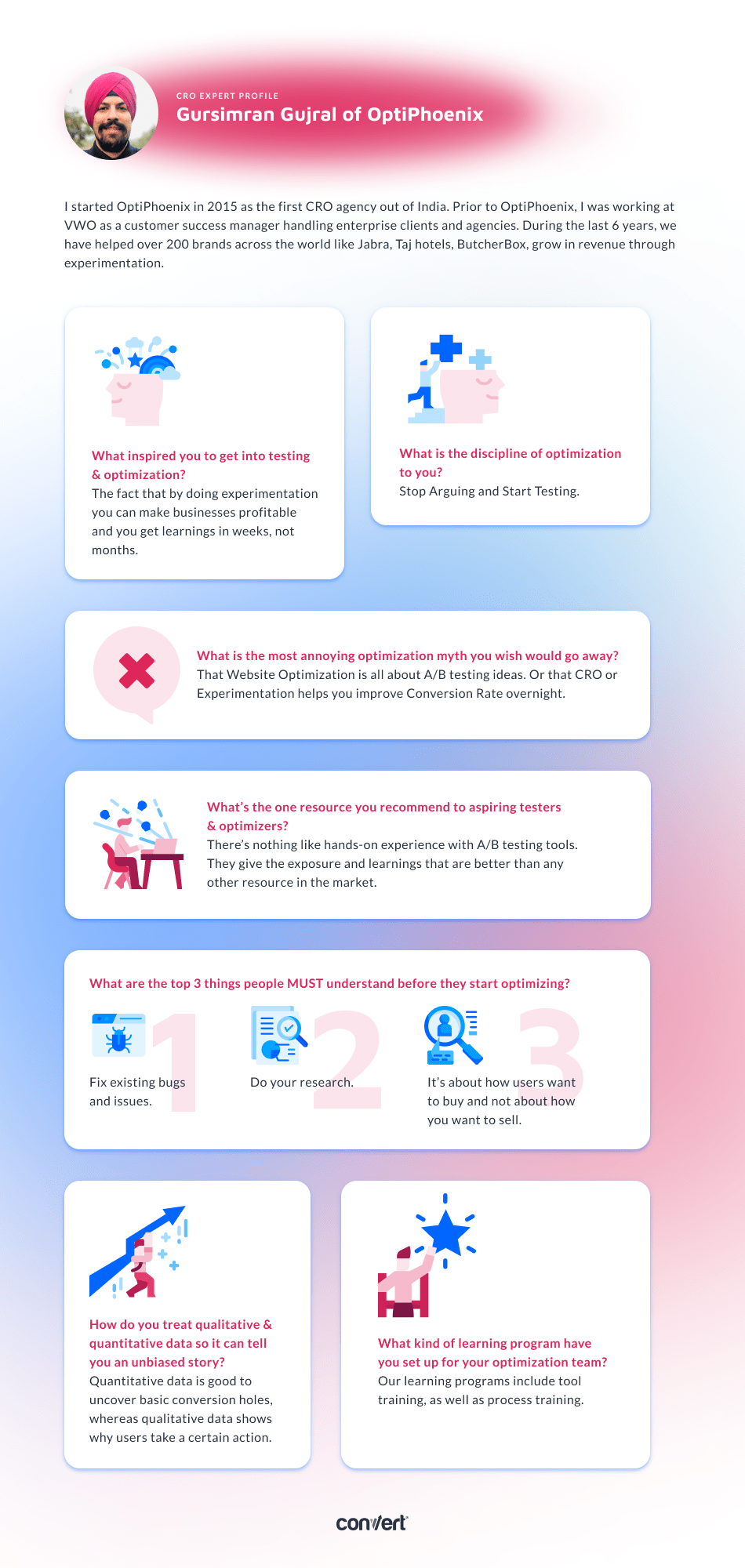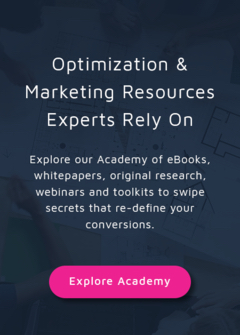Testing Mind Map Series: How to Think Like a CRO Pro (Part 1)
Interview with Gursimran Gujral of OptiPhoenix
You can have the best testing tools, tons of data, and the most experienced testers – but if you don’t have the right mindset, you won’t get the most out of your testing efforts. You’ve read the books, you’ve listened to the podcasts, and you’ve watched the videos. Yet, you still feel like there’s so much more to learn.
The Testing Mind Map Series will give you a framework for thinking about CRO in a new way. By mind mapping the thinking of top industry experts, we can demystify the process and help you develop the mindset of a CRO expert so that you can start applying it to your own work.
In the first installment of the series, we interviewed Gursimran Gujral, Ex- VWO, Managing Director & Head Conversion Specialist at OptiPhoenix, and Convert Certified Agency Partner.
Let’s dive in…
Q1: Simar, tell us about yourself. What inspired you to get into testing & optimization?
I got into testing for two main reasons:
The fact that by doing experimentation you can make businesses profitable and you get the learnings in weeks rather than waiting for months to realise that you are losing the money because of a certain change you did three months back (and sometimes businesses keep wondering why they are losing revenue when they don’t have mechanisms in place to track back).
When I started OptiPhoenix, I knew there is a market where companies want to do website optimization and have purchased all the tools but do not have the aim and strategy to implement the optimization program. Therefore, we started OptiPhoenix to bridge the gap between agencies and tools with an aim to create an experimentation culture amongst companies.
Q2: How many years have you been optimizing for? What’s the one resource you recommend to aspiring testers & optimizers?
I’ve been in the industry for 8 years.
I recommend the CXL Institute, but there’s nothing like hands-on experience with tools. There are a bunch of free tools in the market to give any optimizer or marketing specialist exposure to research and experimentation. Tools like Hotjar Basic, Google Optimize, Google Analytics can give the exposure and learnings that are better than any other resource in the market.
To begin your CRO journey, you can definitely start by reading this book from Chris Goward.
Q3: Answer in 5 words or less: What is the discipline of optimization to you?
Stop Arguing and Start Testing.
Q4: What are the top 3 things people MUST understand before they start optimizing?
- Fix existing bugs and issues. Speed optimization and issues in the payment process should be addressed initially, before doing anything else (as it will directly impact the revenue and profitability).
- DO YOUR RESEARCH. Make sure that the data you have is correct and you can rely on it to baseline the current performance of the website.
- Understand the fact that it is about how users want to buy and not about how you want to sell.
Q5: How do you treat qualitative & quantitative data so it can tell you an unbiased story?
Quantitative data generally is good to uncover basic conversion holes to understand where users drop, how different channels perform, CR from different devices, where users exit the website, etc., whereas qualitative data helps us uncover details of why users drop or take a certain action.
Combining “Where+Why” along with experimentation paints a complete picture of user behaviour.
Studying qualitative data such as heatmaps, session recordings, survey results, or doing usability testing demands a lot more time to make a statistically significant pattern whereas quantitative data is easier to analyze.
When you want to gather more detailed and meaningful insights, it is important to not just rely on GA or Hotjar to collect data but rather push your own custom events to make the data more meaningful such as tagging the recording for all the users who get an error in the checkout process, sending an event into GA for which filter or sorting option is being used the most, etc., so you can make the most of the data available.
Q6: What kind of learning program have you set up for your optimization team? And why did you take this specific approach?
While hiring, our focus is to identify if the candidate has the ability to analyse and understand different data points. We do not focus much on their existing knowledge of the tools we use at OptiPhoenix.
Our learning programs include tool training, as well as process training.
We focus on cultivating:
- hands-on experience on reporting test results because this is something that gives them a real-world experience of how to interpret a small data set of an experiment without looking into the entire site data.
- Basic HTML, CSS is important as well for an optimizer to analyze the type of experiments that are possible using front-end A/B testing.
- Training on regex to be used while setting up the experiments and analyzing data
- This is followed by a Conversion audit of the client website which involves studying qualitative, quantitative data
- Client interaction training/shadowing
- Weekly sessions of knowledge exchange to share learnings and experiences
- Interaction with optimizers that are part of GO Group for knowledge exchange about what’s happening in the experimentation world.
Q7: What is the most annoying optimization myth you wish would go away?
There are two I find equally annoying:
Myth #1: Website Optimization is all about A/B testing ideas.
Before you start A/B testing, tons of other things such as data validation, research, hypothesis generation, checking a website for basic issues need to be taken care of.
Even when you start A/B testing, research alongside A/B testing is very important and holds a crucial part of the overall optimization program.
Myth #2: CRO or Experimentation helps you improve Conversion Rate overnight.
For those of you who are looking for some inspiration, download a copy of the interview with this awesome infographic below. Put it in a swipe file to use later when you need some ideas to inspire your next test.
Share this infographic on your site:
One of the most overlooked aspects of CRO is not what you do, but how you think. If your mindset isn’t in the right place, then no amount of testing tools or data will make a difference.
A CRO expert can help guide your conversion strategy in the right direction. Gursimran Gujral of OptiPhoenix does an excellent job explaining why mindset is so important when it comes to CRO strategies that work. Which piece of advice resonated with you most?
Be sure to stay tuned for our next interview with a CRO expert who takes us through even more advanced strategies! And if you haven’t already, check out our interviews with CRO legends Gursimran Gujral, Haley Carpenter, Rishi Rawat, Sina Fak, Eden Bidani, Jakub Linowski, Shiva Manjunath, Deborah O’Malley, Andra Baragan, Rich Page, Ruben de Boer, Abi Hough, Alex Birkett, John Ostrowski, Ryan Levander, and our latest with Ryan Thomas.

Written By
Gursimran Gujral

Edited By
Carmen Apostu


